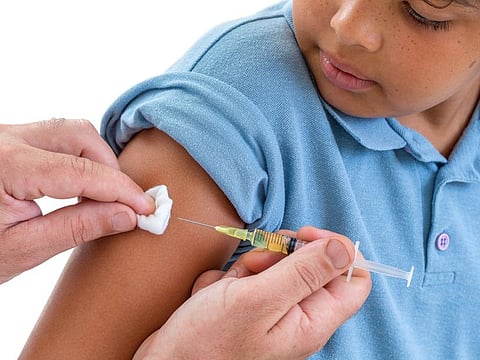Immunisation updates provide better protection: Doctors
A look at the benefits of the revised nation-wide vaccine schedule

Abu Dhabi
Doctors across the UAE have said that recent updates to the UAE’s National Immunisation Programme provide better protection against serious diseases like meningitis and polio.
The updates were announced last week by the UAE Ministry of Health and Prevention (MoHAP),in line with the latest international guidelines in protecting children from communicable diseases.
“It is a brilliant move to mandate the vaccine against meningitis for children in Grade 11. The disease is devastating, and while younger children were protected through the previous immunisation schedule, teenagers remained at risk of developing infections. Now, children will receive the protection they need,” said Dr Mohammad Ibrahim, consultant and head of paediatrics at Danat Al Emarat Hospital for Women and Children.
Meningitis is a dangerous inflammation of the meninges – the membranes that line the skull, the vertebral canal and enclose the brain and spinal cord – caused by a viral or bacterial infection. In young children, meningitis is usually caused by the Haemophilus influenzae Type B bacteria, and the National Immunisation Programme therefore vaccinates children against the bacteria at two, four, six and 18 months.
The meningococcal vaccine now given at Grade 11 also protects against bacterial meningitis, which is the most life-threatening form of the disease. Dr Ibrahim said bacterial meningitis cases typically appear at about 16 to 18 years.
“We would often recommend the vaccine for children, but without insurance coverage, many parents would hesitate to get it. The new guidelines will mean that insurance providers will have to cover the vaccine, thus protecting children at risk,” added Dr Binoy Nellissery, paediatrics and neonatology specialist at Aster Hospital Al Qusais.
Polio vaccine update
Another MoHAP update suspended the oral poliovirus vaccine drops at four months of age, which comprised of a live form of the poliovirus. Instead, children will now be given the vaccine in its inactivated form as part of a combined infanrix-hexa injection that also vaccinates against tetanus, reduced diphtheria, reduced pertussis, hepatitis B and Haemophilus influenzae Type B.
According to the MoHAP, this follows the Global Polio Eradication Initiative and the Global Strategy, which aims to add doses of inactivated poliovirus and reduce oral polio vaccines in the immunisation programmes of various countries. Dr Nelissery explained that such changes are based on the overall immunisation schedule of each country.
Pneumococcal vaccine
Finally, a fourth dose of the pneumococcal vaccine that was previously delivered at 18 months will no longer be given. The other doses scheduled for two, four and six months will still be maintained.
The MoHAP said this change is based on local results and according to vaccine coverage rates, which reached more than 97 per cent. Dr Ibrahim added that the MoHAP checks must have noted sufficient antibodies after the first three doses.
The immunisation programme in the UAE is subject to periodic review. Dr Hussain Al-Rand, undersecretary for healthcare, health centres and clinics at the MoHAP, said these reviews are undertaken by the national Higher Committee of Immunisation, which includes Ministry representatives, as well as others from the Abu Dhabi Department of Health, the Dubai Health Authority, academic institutions and the private sector.
Revised National Immunisation Programme
At birth: 2 injections (1) BCG vaccine against tuberculosis (2) vaccine to protect against Hepatitis B
2 months: 2 injections (1) vaccine against Haemophilus Influenzae Type B + Hepatitis B + tetanus, reduced diphtheria and reduced pertussis + inactivated poliovirus vaccine (2) pneumococcal conjugate vaccine
4 months: 2 injections (1) vaccine against Haemophilus Influenzae Type B + Hepatitis B + tetanus, reduced diphtheria and reduced pertussis + inactivated poliovirus vaccine (2) pneumococcal conjugate vaccine. (The oral poliovirus drops given at this age have been suspended in the updated immunisation schedule.)
6 months: 2 injections (1) vaccine against Haemophilus Influenzae Type B + Hepatitis B + tetanus, reduced diphtheria and reduced pertussis + inactivated poliovirus vaccine (2) pneumococcal conjugate vaccine
12 months: 2 injections (1) vaccine against measles, mumps and rubella (2) vaccine against rubella
18 months: 2 injections + 1 drop (1) Vaccine against Haemophilus Influenzae Type B; vaccine against tetanus, reduced diphtheria and reduced pertussis (2) pneumococcal conjugate vaccine (3) oral poliovirus vaccine drop. (The vaccine against pneumococcal diseases has been dropped.)
Grade 1: 3 injections + 1 drop (1) vaccine against tetanus, reduced diphtheria and reduced pertussis (2) vaccine against measles, mumps and rubella (3) vaccine against varicella (4) oral poliovirus vaccine drop
Grade 9: 1 injection (1) vaccine against rubella
Grade 11: 3 injections (for females) + 1 drop (1) vaccine against tetanus, reduced diphtheria and reduced pertussis, (2) vaccine against papillomavirus that can cause genital warts and cervical cancer (only for females) (3) vaccine against meningitis (4) oral poliovirus vaccine. (The vaccine against meningitis has been added to the schedule).



